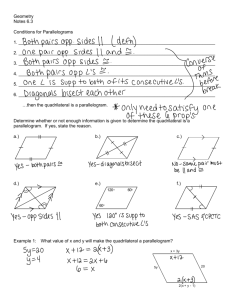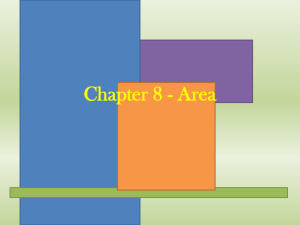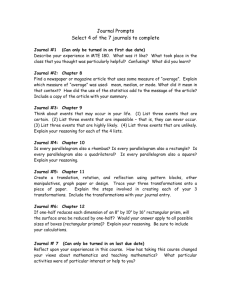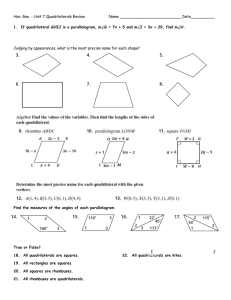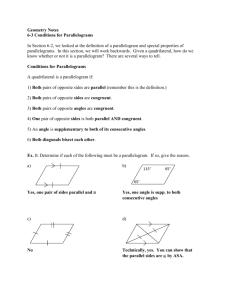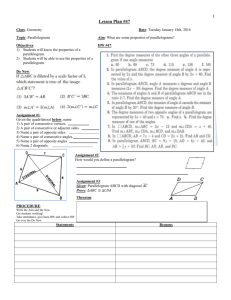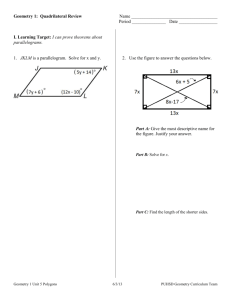Parallelograms MA 341 – Topics in Geometry Lecture 05
advertisement
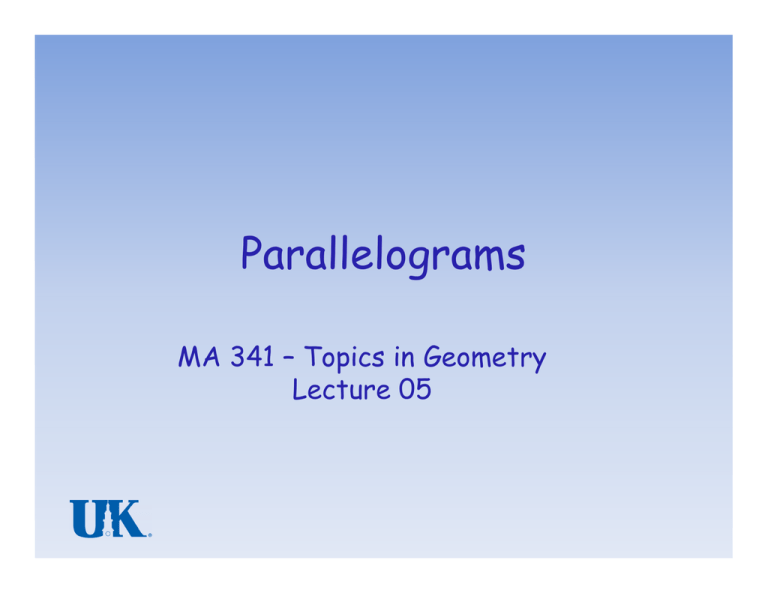
Parallelograms MA 341 – Topics in Geometry Lecture 05 Definitions A quadrilateral is a polygon with 4 distinct sides and four vertices. Is there a more precise definition? P1 09-Sept-2011 P2 P3 MA 341 001 2 Definitions Quadrilateral Quadrangle Tetragon These will all mean the same object: 4 line segments that intersect only at the four endpoints (vertices). 09-Sept-2011 MA 341 001 3 Important Types of Quadrilaterals Rectangles Squares Parallelograms Rhombus Trapezoid (trapezium) Kites The definitions are important. 09-Sept-2011 MA 341 001 4 Rectangles A quadrilateral is a rectangle if … it contains 4 right angles. What is the difference between the definition of an object and properties that an object has? 09-Sept-2011 MA 341 001 5 Squares A quadrilateral is a square if … it is a rectangle with all sides congruent. it is a rectangle with adjacent sides congruent. Are these the same thing? 09-Sept-2011 MA 341 001 6 Parallelograms A quadrilateral is a parallelogram if … opposite sides are parallel. Is a rectangle a parallelogram? 09-Sept-2011 MA 341 001 7 Rhombi or Rhombuses A quadrilateral is a rhombus if … all four sides have the same length. Is a square a rhombus? 09-Sept-2011 MA 341 001 8 Trapezoid A quadrilateral is a trapezoid if … contains one pair of parallel sides. Is a parallelogram a trapezoid? 09-Sept-2011 MA 341 001 9 Kites A quadrilateral is a kite if … the four sides can be grouped into two pairs of equal-length sides that are next to each other. 09-Sept-2011 MA 341 001 10 Kites 09-Sept-2011 MA 341 001 11 Theorems Theorem: Opposite sides of a parallelogram are congruent. Proof Is the converse to this statement true? 09-Sept-2011 MA 341 001 12 Theorems Theorem: In quadrilateral □ABCD if ABCD and ADBC, then ABCD is a parallelogram. Proof: Homework Problem #1 09-Sept-2011 MA 341 001 13 Theorems Theorem: A quadrilateral is a parallelogram if and only if its diagonals bisect one another. Proof: (1) If ABCD is a parallelogram then AC and BD bisect each other. 09-Sept-2011 MA 341 001 14 Theorems Proof: (2) In ABCD if AC and BD bisect each other then ABCD is a parallelogram. 09-Sept-2011 MA 341 001 15 Properties of Parallelograms • Opposite sides of a parallelogram are equal in length. • Opposite angles of a parallelogram are equal in measure. • The area of a parallelogram is the product of the base the height. • Opposite sides of a parallelogram will never intersect. • The area is twice the area of a triangle created by one of its diagonals. • The area equals to the magnitude of the vector cross product of two adjacent sides. 09-Sept-2011 MA 341 001 16 Properties of Parallelograms • The diagonals of a parallelogram bisect each other. • Any non-degenerate affine transformation takes a parallelogram to another parallelogram. • A parallelogram has rotational symmetry of order 2 (through 180°). If it also has two lines of reflectional symmetry then it must be a rhombus or a rectangle. • The perimeter of a parallelogram is 2(a + b) where a and b are the lengths of adjacent sides. 09-Sept-2011 MA 341 001 17 Properties of Parallelograms • Consecutive angles of a parallelogram are supplementary. 09-Sept-2011 MA 341 001 18 Interesting Facts Parallelograms • Start with a parallelogram, ABCD. A B D 09-Sept-2011 C MA 341 001 19 Interesting Facts Parallelograms • Construct an equilateral triangle on the outside of each side of the parallelogram. • The vertices, PQRS, form a parallelogram. 09-Sept-2011 MA 341 001 20 Q A P B R D 09-Sept-2011 C S MA 341 001 21 Interesting Facts Parallelograms • Construct an equilateral triangle on the inside of each side of the parallelogram PQRS. 09-Sept-2011 MA 341 001 22 Q A P X Y W D 09-Sept-2011 Z B R C S MA 341 001 23 Interesting Facts Parallelograms • XZYW is a parallelogram. • Is XZYW = ABCD or is it coincidence? 09-Sept-2011 MA 341 001 24 Interesting Facts Parallelograms • We can write P in terms of A and D. • In fact, we can write the third vertex of an equilateral triangle in terms of the other two vertices – using complex numbers! 09-Sept-2011 MA 341 001 25 Aside-Equilateral Triangles In the plane of ΔABC we can choose a Cartesian coordinate system so that we can identify points in the plane with complex numbers – (a,b) <-> a + bi. C Let T denote the rotation through 120o in the positive (counterclockwise) direction. This means that T3 = 1, or, since T ≠ 1, A 09-Sept-2011 MA 341 001 B 26 Aside-Equilateral Triangles T3 – 1 = 0 (T – 1)(T2 + T + 1) = 0 and since T ≠ 1, T2 + T + 1 = 0 Theorem: ΔABC is equilateral iff A + TB + T2C = 0. C B A 09-Sept-2011 MA 341 001 27 Aside-Equilateral Triangles Proof: ΔABC is equilateral iff each side could be obtained from another side by a rotation through 60o around their common vertex. A rotation through 120o in the opposite direction, brings one side in the direction exactly opposite to the other making their sum equal to 0. 09-Sept-2011 MA 341 001 28 Aside-Equilateral Triangles C C-A B B-A A A-C 09-Sept-2011 -T(B – A) MA 341 001 29 Aside-Equilateral Triangles C T(B – A) + C – A = 0 C + TB – (1+T)A = 0 C = (1+T)A - TB C-A B B-A A A-C 09-Sept-2011 MA 341 001 30 Q P = (1+T)D – TA Q = (1+T)A - TB R = (1+T)B – TC S = (1+T)C - TD A P B R D 09-Sept-2011 C S MA 341 001 31 T2 + T + 1 = 0 Q X = (1+T)S – TR = (1+T)((1+T)C – TD) – T((1+T)B – TC) = ((1+T)2+T2)C – (1+T)TD – T(1+T)B = (-1 + 2+2T+2T2)C – (T2+T)D – (T2+T)B = -C + D + B A P X Z B BUT A – B = D – C So X=A–B+B=A 09-Sept-2011 Y W D R C S MA 341 001 32 Interesting Facts Parallelograms • Start with a parallelogram, ABCD. A B D 09-Sept-2011 C MA 341 001 33 • Draw the squares on the outside of the sides of the parallelogram. A B D 09-Sept-2011 C MA 341 001 34 • The segments joining the centers of these squares is a square. A B D 09-Sept-2011 C MA 341 001 35 Varignon’s Theorem • Let ABCD be a convex quadrilateral and X, Y, Z, and W the midpoints of the sides. XYZW is a A B parallelogram. D 09-Sept-2011 MA 341 001 C 36
